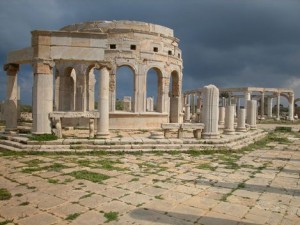Libya boasts a rich cultural heritage; Palaeolithic rock paintings, Greek and Roman ruins and ancient desert oases. These historic treasures, including six UNESCO World Heritage sites, have suffered years of neglect and most recently the perils of conflict.
During the conflict in Libya there were allegations that pro-Gaddafi troops and missiles were being hidden in the ancient city of Leptis Magna and that Gaddafi was using it as an archaeological shield.
With such explosive storage, the risk of damage was great, but the sites of Leptis Magna and Sabratha have survived the conflict unscathed. That is excellent news for the cultural heritage of Libya and the tourism industry that the nation hopes to resurrect, NATO says in a special feature.
Conflict is not the only threat to ancient artefacts. There is also the risk that a breakdown in law and order can give criminals the opportunity to steal items of great significance. In perhaps the worst case of looting during the conflict, nearly eight thousand ancient gold, silver and bronze coins, as well as a small number of artefacts, were stolen from a Benghazi bank vault.
In some areas documentation, archiving and cataloguing was never carried out, making it difficult to estimate the loss to Libya’s cultural heritage. But, by and large, Libya seems to have avoided the kind of cultural looting and vandalism that occurred after the invasion of Iraq.
‘No Strike’ list
In a first of its kind initiative, two men were instrumental in setting up a ‘No Strike List’ of heritage and cultural sites that should be preserved in the conduct of air operations. They were Karl Von Habsburg, president of the ‘Blue Shield Committee’ in Austria and Dr Joris Kila, teacher at the University of Amsterdam and Chairman of ‘The International Military Cultural Resources Work Group’.
They have now returned to make an assessment of the damage inflicted by the conflict on Libya’s heritage. “We both know the importance to be fast and in a place where there is a potential conflict or an actual conflict,” says Karl, “you have to be there really fast to make an assessment and to see what you can do to immediately help.”
The two have been granted special access to sites that several months earlier had been welded shut for protection, a practice both experts agree is critical to protect heritage in times of unrest. While it works for museums, protecting sites like Leptis Magna and Cyrene in wide-open spaces is a lot more difficult.
The work they are undertaking fills the gap in the protection of heritage sites until the Libyan Government is able to take over. “We hope that we will encourage them to take over part of our duties,” says Joris, “and do the work that has to be done.”
Some of the sites they visited had been in close proximity to air strikes and escaped with only cosmetic damage. “It seem like our no strike list with cultural sites was very effective,” Joris notes, “because we didn’t find serious damage with bombardments by NATO on cultural sites.”
Returning to help
It is not only international archaeologists coming to the aid of Libya’s ancient sites. Hafed Walda is a Libyan archaeologist who lives in the UK. He has returned to his homeland to safeguard its cultural heritage.
“My family came from a place in Misurata near to Leptis Magna,” says Hafed. “I was always fascinated about it, and once I had the opportunity to study the art and architecture I became interested in how to preserve this for the next generation.”
Hafed believes that one of the biggest problems facing cultural sites in Libya is the lack of training and resources for those tasked with protecting them. “I see some of the heritage being neglected and marginalised to the degree where sometimes you feel despair. The people here don’t have the resources; sometimes they don’t have the know-how.”
Hafed has been promoting his message through the media and reaching out to international organisations in the hope that they will be able to help.
“It is important for everybody to make sure Libya really uses their heritage as their identity because really it’s the world’s heritage so Libya will be assimilated into the world. It’s a huge task, it is really a big task and Libya cannot do it on its own.”
Preserving the past in the future
NATO’s mission in Libya ended on October31, 2011, completing one of the most successful air campaigns in the history of the Alliance. That the campaign was also carried out without serious damage to Libya’s ancient heritage sites is a major achievement.
Cooperation between NATO and other key actors, such as UNESCO, will be key to ensure the protection of cultural and historical property in times of unrest, thereby complying with international legal obligations.
(Source: Tripoli Post)





